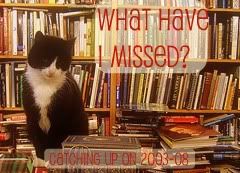 This is supposed to be my February book...but I ran out of days in February, thanks to my vacation/honeymoon. So here's the anxiously-awaited (if responses to my Goodreads review tweet are any indication!) of 2005 Printz Award winner How I Live Now.
This is supposed to be my February book...but I ran out of days in February, thanks to my vacation/honeymoon. So here's the anxiously-awaited (if responses to my Goodreads review tweet are any indication!) of 2005 Printz Award winner How I Live Now.
Alone in the countryside, the five kids band together as a family in ways Daisy never imagined possible - from becoming so close they're practically telepathic to the decidedly more than familial love she shares with Edmond. But as the danger moves closer to their secluded outpost, Daisy must draw on reserves of strength she hardly knows she has to try to keep the little family together.
Pretty much every review of this I saw before going in brings up the incest - and now I guess I'm guilty of that too. But all of those reviews made such a big deal out of it I was sure I was going to end up with a romance story with some vaguely dystopian feelings. Let me assure you, that's totally not the case. Really, I'm kind of surprised that cousin-incest really gets people up in arms at this point. Just because you don't want to bang your cousin doesn't mean it's actually the grossest thing in the world. Much grosser: undead boyfriends that watch you sleep and try to control who you can spend time with. Or kidnappers. Abusive relationships of any kind, really. Priorities, people.
What this is, is a survival story. This is about how Daisy finds the strength, through extraordinary circumstances, to stop beating herself up and rediscovering her family and her will to live.
But ultimately, that wasn't quite enough to keep me riveted to the story. I put the book down a couple of times and wandered away to read something else. It may have had something to do with the writing style - it's very postmodern what with its complete absence of quotation marks. Considering the kids are pretty much psychic that makes it very hard to tell what is actually spoken and what is thought. The psychic-abilities were a bit random themselves - the whole of the writing just felt rather unsettling and unjustified.
What I did like was how Rosoff was able to subtly show how Daisy evolves over the course of the novel. There are hardly any moments when these changes are stated outright and instead they're left for the reader to pick up on and contemplate. An excellent example of an author trusting her audience to get it without hitting us over the head with character development or Messages.